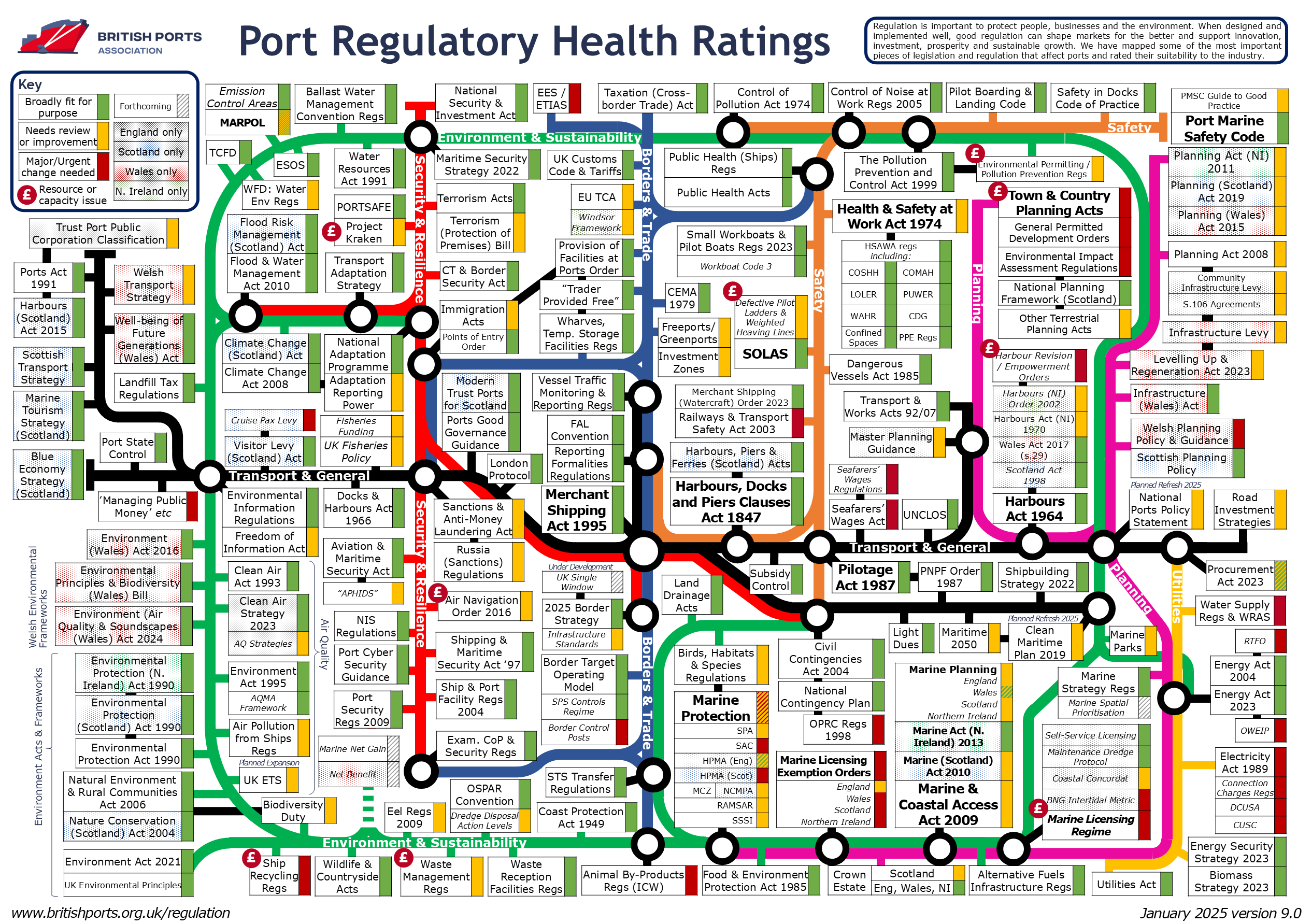The latest version of the British Ports Association’s (BPA) regulatory map shows that more than one in ten port regulations are in need of urgent reform, with planning in particularly poor condition.
The British Ports Association has published its 2025 regulatory map, which assesses the health of the legislative and regulatory regime that ports operate within. Four in ten regulations are of concern, with 12% of the overall number in need of significant or urgent reform. The BPA has been mapping the legislation, regulation, industry codes, guides, and strategies that govern and shape how UK ports operate since 2019. Whilst the map is not designed to be exhaustive, it now covers 200 items that affect how ports operate and grow.
Alongside the updated map, the Association has updated and expanded the regulatory directory which explains the relevance of each entry to ports and sets out the BPA’s position in priority areas.
The directory can be found here: www.britishports.org.uk/regulation
Furthermore, the map and associated directory demonstrate the regulatory complexity that ports operate within, often with 200 laws, regulations, codes, guides, and strategies that have some bearing on ports now covered. The priorities highlighted for reform broadly reflect the BPA’s policy priorities, which include the offshore energy transition, energy connectivity, planning, dredging, and dealing with abandoned vessels.

The BPA, which represents over 400 ports and terminals that collectively facilitate 86% of the UK’s seaborne trade as well as much more, is currently consulting the industry on these priorities.
Safety
Safety, the top priority for any port, is broadly functioning well, with the only areas for concern being legislation that the industry is keen to see extended, enforced, or updated. These include better resourcing for the MCA to enforce regulations on pilot ladders for safer pilot transfers and closing loopholes that allow non-professional mariners to drink alcohol whilst navigating leisure vessels.
Borders & trade
Priorities for improvement in borders and trade remain Border Control Posts, which some ports were forced to build at significant expense following the UK’s exit from the European Union.
Security
In the security and resilience category there was just one ‘red’ rating, the ‘OPRC’ regulations which require ports to be prepared for oil spills. These regulations apply to ports with a turnover of more than £1m. Inflation has meant that smaller and smaller entities that were never intended to be covered by the regulations are being pulled into scope.
Environment
Environment and sustainability frameworks are broadly assessed as fit for purpose although duties are often placed on harbour authorities inappropriately through regulation aimed at ‘public bodies’. Licensing and consenting are the main areas of concern in this category and has become critical over the course of 2024 for some things such as Harbour Orders.
Planning
Planning and utilities are a big cause for concern, reflecting the sector’s recent focus on planning reform. One in three regulations related to planning were in need of urgent reform. This covers broad and niche issues, including difficulties with the new biodiversity conditions on planning in England, energy connections, and the renewable transport fuel obligation. These can all limit the growth opportunities and ambitions for ports.
Decarbonisation
Decarbonisation continues to be a major theme across maritime and this is set to continue in 2025. With ports looking at decarbonising and electrifying their own operations as well as facilities for customers, improving the regulatory process is now an urgent priority for ports.
In addition, the sector is also expected to play a key role in the rollout of offshore wind and the UK’s renewable energy ambitions, but this will need improved consenting for both terrestrial and marine development.
Ports are fundamental to the marine economy, the prosperity and resilience of coastal communities, and to government priorities such as the energy transition. Reform is needed soon, particularly around planning and in some other areas to improve port competitiveness.
…said Richard Ballantyne, Chief Executive, British Ports Association.
The map also highlights the rules around government spending and investment as an area that needs urgent reform. The BPA has set out its views on how increased government investment directly in ports through the National Wealth Fund should work and where it should sit alongside other funding such as future rounds of the Clean Maritime Demonstration Competition.

































































